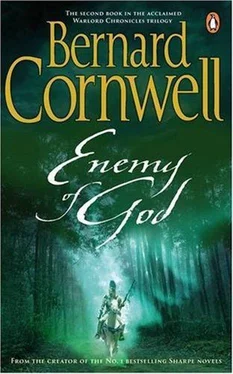‘Some,’ she said, ‘but it’s fading, Derfel. All our magic is fading. We need the Cauldron.’ She smiled in the dark. ‘It isn’t far away now,’ she said, ‘I can feel it. It still lives, Derfel, and we’re going to find it and restore it to Merlin.’ There was a passion in her now, the same passion she had shown as we neared the end of the Dark Road. Arthur marched through the dark for his Guinevere, I for revenge and Nimue to summon the Gods with the Cauldron, but still we were few and the enemy was many. We were now deep inside Lancelot’s new land, yet we saw no evidence of his warriors nor any sign of the rabid Christian bands who were still said to be terrorizing the rural pagans. Lancelot’s spearmen had no business in this part of Dumnonia for they were watching the roads from Glevum, while the Christians must have gone to support his army in the belief it did Christ’s work, so we walked unmolested as we dropped down from the great plain onto the river lands of Dumnonia’s southern coast. We skirted the fortress town of Sorviodunum and smelt the smoke of the houses that had been burned there. Still no one challenged us because we walked beneath the near-full moon and were protected by Nimue’s spells.
We reached the sea on the fifth night. We had slipped past the Roman fortress of Vindocladia where Arthur was sure a garrison of Lancelot’s troops would be in place, and by dawn we were hidden in the deep woods above the creek where the Sea Palace stood. The palace was just a mile to our west and we had reached it undetected, coming like night ghosts in our own land. And we would make our attack at night too. Lancelot was using Guinevere as a shield, and we would take his shield away and, thus freed, carry our spears to his treacherous heart. But not for Mordred’s sake, for now we fought for Arthur and for the happy realm we saw beyond the war. As the bards now tell it, we fought for Camelot.
Most of the spearmen slept that day, but Arthur, Issa and I crawled to the edge of the wood and stared across the small valley at the Sea Palace.
It looked so fine with its white stone gleaming in the rising sun. We were gazing at its eastern flank from a crest that was slightly lower than the palace. Its eastern wall was broken by only three small windows so that it looked to us like a great white fortress on a green hill, though that illusion was spoiled somewhat by the great sign of the fish that had been crudely smeared in pitch on the limewashed wall, presumably to guard the palace against the anger of any itinerant Christians. The long southern facade which overlooked the creek and the sea that lay beyond a sandy island on the creek’s southern bank was where the Roman builders had put their windows, just as they had relegated the kitchens and slave quarters and granaries to the northern ground behind the villa where Gwenhwyvach’s timber house stood. There was now a small village of thatched huts there as well, I guessed for the spearmen and their families, and a tangle of smoke trails rose from the huts’ cooking-fires. Beyond the huts were the orchards and vegetable fields, and beyond them again, bordered by the deep woods that grew thick in this part of the country, lay fields of partly cut hay.
In front of the palace, and just as I remembered them from that distant day when I had taken Arthur’s precious oath on the Round Table, the two embankments topped by arcades stretched towards the creek. The palace was all sunlit, so white and grand and beautiful. ‘If the Romans came back today,’
Arthur said proudly, ‘they would never know it had been rebuilt.’
‘If the Romans came back today,’ Issa said, ‘they’d have a proper fight on their hands.’ I had insisted that he come to the trees’ edge for I knew of no one with better eyesight and we needed to spend this day discovering just how many guards Lancelot had put in the Sea Palace. We counted no more than a dozen guards that morning. Just after dawn two men climbed to a wooden platform that had been built onto the roof’s summit and from there they watched the road that led north. Four other spearmen paced up and down the nearest arcade, and it seemed sensible to deduce that four more would be stationed on the western arcade that was hidden from us. The other guards were all on the land that lay between a stone balustraded terrace at the bottom of the gardens and the creek, a patrol that evidently guarded the paths that led along the coast. Issa, divested of his armour and helmet, made a reconnaissance in that direction, creeping through the woods in an attempt to see the villa’s facade between the twin arcades.
Arthur gazed fixedly at the palace. He was quietly elated, knowing that he was on the brink of a daring rescue that would send a shock through Lancelot’s new kingdom. Indeed, I had rarely seen Arthur so happy as he was that day. By coming deep into Dumnonia he had cut himself off from the responsibilities of government and now, as in the long-ago past, his future depended only on the skill of his sword. ‘Do you ever think of marriage, Derfel?’ he suddenly asked me.
‘No, Lord,’ I said. ‘Ceinwyn has sworn never to marry, and I see no need to challenge her.’ I smiled and touched my lover’s ring with its little scrap of the Cauldron’s gold. ‘Mind you,’ I went on, ‘I think we’re more married than most couples who’ve ever stood before a Druid or a priest.’
‘I don’t mean that,’ he said. ‘Do you ever think about marriage?’ He stressed the word ‘about’.
‘No, Lord,’ I said. ‘Not really.’
‘Dogged Derfel,’ he teased me. ‘When I die,’ he said dreamily, ‘I think I want a Christian burial.’
‘Why?’ I asked, horrified, and touching my mail coat so that its iron would deflect evil.
‘Because I shall lie with my Guinevere for all time,’ he said, ‘she and I, in one tomb, together.’
I thought of Norwenna’s flesh hanging off her yellow bones and grimaced. ‘You’ll be in the Otherworld with her, Lord.’
‘Our souls will, yes,’ he admitted, ‘and our shadowbodies will be there, but why can’t these bodies lie hand in hand as well?’
I shook my head. ‘Be burned,’ I said, ‘unless you want your soul to wander lost across Britain.’
‘Maybe you’re right,’ he said lightly. He was lying on his belly, hidden from the villa by a screen of ragwort and cornflowers. Neither of us was in our armour. We would don that war finery at dusk before we came out of the dark to slaughter Lancelot’s guards. ‘What makes you and Ceinwyn happy?’ Arthur asked me. He had not shaved since we had left Glevum and the stubble of his new beard was growing grey.
‘Friendship,’ I said.
He frowned. ‘Just that?’
I thought about it. In the distance the first slaves were going to the hayfields, their sickles catching the morning sun in bright glints. Small boys were running up and down the vegetable gardens to frighten the jays away from the pea plants and the rows of gooseberries, redcurrants and raspberries, while nearer, where some convolvulus trailed pink on brambles, a group of greenfinches quarrelled noisily. It seemed that no Christian rabble had disturbed this place, indeed it seemed impossible that Dumnonia was at war at all. ‘I still feel a pang every time I look at her,’ I admitted.
‘That’s it, isn’t it?’ he said enthusiastically. ‘A pang! A quickness in the heart.’
‘Love,’ I said drily.
‘We’re lucky, you and I,’ he said, smiling. ‘It’s friendship, it’s love, and it’s still something more. It’s what the Irish call anmchara, a soul friend. Who else do you want to talk to at the day’s end? I love the evenings when we can just sit and talk and the sun goes down and moths come in to the candles.’
‘And we talk of children,’ I said, and wished I had not, ‘and of servants’ quarrels, and whether the cross-eyed kitchen slave is pregnant again, and we wonder who broke the pothook, and whether the thatch needs repair or whether it will last another year, and we try to work out what to do about the old dog that can’t walk any more, and what excuse Cadell will conjure up for not paying his rent again, and we discuss whether the flax has steeped enough, and if we should rub butterwort on the cows’ udders to improve their yield. That’s what we talk of.’
Читать дальше












